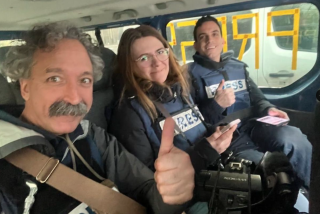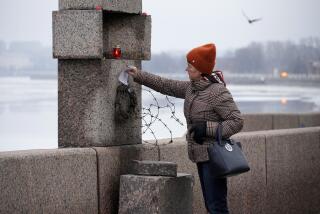10 held in slaying of investigative reporter in Russia
moscow -- Ten suspects, including Russian police and security officials, have been arrested in the killing last year of crusading investigative journalist Anna Politkovskaya, the country’s top prosecutor announced Monday.
“I would like to point out that regretfully former and current officers of the Interior Ministry and the Federal Security Service took part in tracking Politkovskaya and obtaining information on her. They have been arrested,” Russian Prosecutor General Yuri Chaika said during a news conference.
Chaika did not identify those being held. He said one suspect is a Chechen man who allegedly headed a contract murder gang, but it was not immediately clear whether he was among those in custody.
Politkovskaya, who had gained international acclaim for her critical reporting on Moscow’s actions in war-torn Chechnya, was gunned down in her apartment building in October. The outspoken critic of President Vladimir V. Putin was born in New York City, the daughter of a Soviet diplomat, and also held U.S. citizenship.
Editors at Novaya Gazeta, the newspaper where Politkovskaya worked, praised the investigation as having identified suspects who appeared to be genuinely involved in the slaying.
“We are fully satisfied with the way the investigation proceeded,” said Dmitry Muratov, Novaya Gazeta’s editor in chief. “It was an honest, unbiased and efficient investigation. What’s more, we fully cooperated with the investigators and they didn’t hide anything from us.”
The investigation discovered that officers from the Interior Ministry police and the Federal Security Service, or FSB, the domestic successor agency to the Soviet-era KGB, played “very instrumental” roles in setting up the slaying, Muratov said.
“We know everything the investigators know, and they know everything we know,” he said. “This is why the authorities couldn’t hide the results of the investigation even if they wanted to.”
Chaika said those arrested were the alleged “organizers, accomplices and perpetrators of the crime.”
He suggested that the order to kill Politkovskaya came from opponents of Putin living abroad and was aimed at casting suspicion on the president’s government.
Pro-Kremlin media made similar statements immediately after Politkovskaya was slain. The same argument was later used after Kremlin critic Alexander Litvinenko died in London last year from radioactive polonium-210 poisoning.
On the day Politkovskaya was buried, Putin also endorsed the idea, saying at a news conference: “This murder has done more damage to Russia -- and the current authorities of Russia and Chechnya, which she has been covering lately in her work -- than Politkovskaya’s articles.”
He also said then that the 2004 killing in Moscow of Paul Klebnikov, the American editor of Forbes magazine’s Russian-language edition, might have been designed by Russian exiles to discredit his government.
The main target of such accusations appears to be exiled Russian tycoon Boris Berezovsky, a former Kremlin insider who helped bring Putin to power but is now one of the Russian president’s fiercest critics. Litvinenko was an associate of Berezovsky, who has political asylum in Britain.
British authorities have accused Russian businessman Andrei Lugovoy with Litvinenko’s slaying and demanded that Moscow extradite him to London. The Kremlin, noting that Russia’s constitution bans extradition of its citizens, has refused. Lugovoy charged at a May news conference that the tycoon was probably responsible for Litvinenko’s death, an argument that has been widely broached in Russian media.
At Monday’s news conference, Chaika picked up the theme, asserting that the damage to Russian authorities from Politkovskaya’s killing was so great that it must have been ordered by Putin’s enemies.
The killing “was of benefit above all to those people and organizations who aim to destabilize the situation in the country, overthrow the constitutional order, create a crisis in Russia, return to the old system of government in which money and oligarchs decided everything, discredit the leaders of the Russian state and provoke external pressure on the leadership of our country,” Chaika said.
While praising the overall investigation, Muratov disputed the motive cited by Chaika.
“They chose to interpret the results of the investigation in their own way,” the editor said. “I totally disagree with this politicized interpretation of the investigation’s findings.”
Lev Ponomaryov, head of the Moscow-based For Human Rights organization, said he was “amazed” to see Chaika make “a political conclusion based on an investigation that is far from being over.”
“It’s outright pressure on the investigation,” he said.
Stanislav Belkovsky, president of the National Strategy Institute, a Moscow think tank, said he believed that “both Politkovskaya and Litvinenko could have been most likely killed on the orders of one powerful group inside the Kremlin to set up another powerful Kremlin clan in the course of a fierce struggle to influence Putin’s decisions.”
“Chaika’s attempt to throw more charges at Berezovsky is nothing but ridiculous,” he added. “No one will buy this either outside Russia or even inside Russia. . . . It is clear that Chaika’s task is to voice the Kremlin’s official position on this crime.”
--
Times staff writer Sergei L. Loiko contributed to this report.
More to Read
Sign up for Essential California
The most important California stories and recommendations in your inbox every morning.
You may occasionally receive promotional content from the Los Angeles Times.










